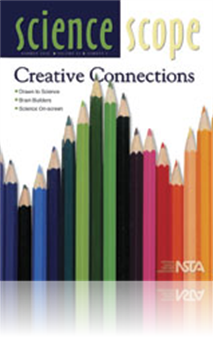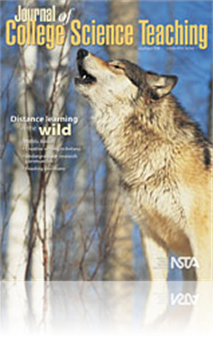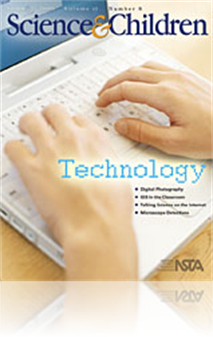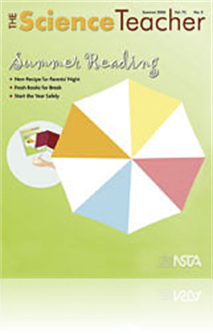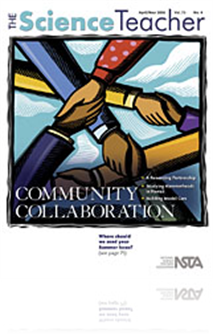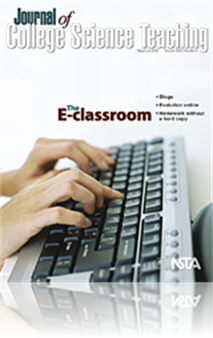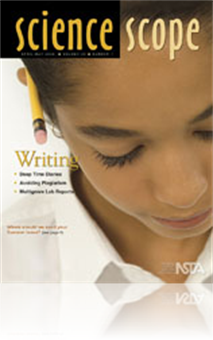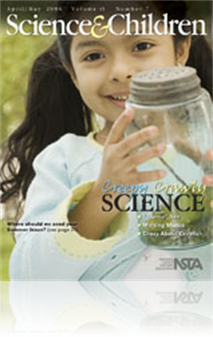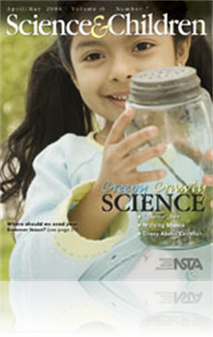All Resources
Journal Article
Tried and True: How the brain visually perceives the world
The eyes are said to be the "mirror of the soul" or similiar to the "lens of a camera." Have you ever wondered how such a small feature of our anatomy can have such a big impact on our abilities to perceive the world around us? These classic activiti...
Journal Article
Undergraduate Research Communities: A Powerful Approach to Research Training
We applied the concept of learning communities, whereby students develop their ideas in cohort-based settings, to undergraduate research training. This creates powerful research communities where students practice science from observation to experim...
Journal Article
Talking Science, Modeling Scientists
Do you want your students to share their investigation findings in a meaningful way? Or to communicate like real scientists do--beyond conducting investigations in the classroom? Fourth-grade students in the Upstate of South Carolina are doing just...
Journal Article
Commentary: Laboratory Science Teacher Professional Development
In 2004, the U.S. Secretary of Energy announced a new science education initiative to reinvigorate the U.S. Department of Energy's (DOE) involvement in K-12 science education. Part of this new initiative is a revitalized professional development prog...
Journal Article
Editorial: A Change in Terrain or a Shift in Perspective?
Guess what? While you weren't looking, the world got flattened. At least, that's the conclusion of Thomas L. Friedman in his explosive book, The World Is Flat: A Brief History of the Twenty-First Century. Friedman asserts that a recent confluence o...
Journal Article
Those Lazy, Hazy, Crazy Days of Summer Reading
Whether your summer includes travel to far away places or day trips to familiar haunts, this time of change should also be a time of professional growth. Whatever path you walk this summer, take along a book. You may already have your own list of "...
Journal Article
A Fifth Grader's Guide to the World
The challenge for today's elementary teachers is not whether but rather how to use computers to effectively teach students essential skills and concepts. One exciting way of meeting this challenge is to use Geographic Information Systems (GIS), comp...
Journal Article
Assessing Student Understanding with Technology
Most science teachers are amazed when grading tests and quizzes, often wondering how and why students have reached a conclusion, particularly when students fail to provide a detailed account of their logic. Ideally, a variety of assessments should be...
Journal Article
Research and Teaching: Active Learning Is Not Enough
In this article, the author examines the frequency of assessment and how it impacts learning in an undergraduate biology course employing a student-centered, active learning pedagogy. Frequent assessment was associated with better student performanc...
Journal Article
Turning the Potential Liability of Large Enrollment Laboratory Science Courses Into an Asset
Data sharing among multiple lab sections increases statistical power of data analyses and informs student-generated hypotheses. This article describes how to collect, organize, and manage data to support replicate and rolling inquiry models, with th...
Journal Article
Information Literacy in Introductory Biology
Incorporating information literacy exercises into the science curriculum will help students to navigate through the myriad of information available in different formats, and to become better scientific thinkers and writers. Here we describe how we i...
Journal Article
Capturing Student Interest in Astrobiology Through Dilemmas and Paradoxes
Astrobiology is an interdisciplinary science course that combines essential questions from life, physical, and Earth sciences. An effective astrobiology course also capitalizes on students' natural curiosity about social science implications of stud...
Journal Article
The Case Study: Assessment of Case Study Teaching -- Where Do We Go From Here? Part II
It is natural for faculty to select paradigms with which they have familiarity, and in the sciences, measurement is a careful, precise aspect of the research method. In science there has been a bias towards counting. However, measurement is not as ...
Journal Article
Undergraduate biology programs are currently undergoing reform to involve students in biomedical research. Engaging students in more active, hands-on experiments allows students to discover scientific principles for themselves, and to develop techni...
Journal Article
A new program, On Recent Discoveries by Emory Researchers (ORDER), has been developed as a bridge across the ever-widening gap between graduate and undergraduate education in the sciences. This bridge is created by merging the needs of graduate/post...
Journal Article
Introducing Evolution Using Online Activities in a Nonmajor Biology Course
Effective virtual education requires activities that promote application of scientific thinking skills, elaboration of research questions, hypothesis proposal, experimental design, and result presentation in a collaborative environment. Blackboard i...
Journal Article
Blogs: Applications in Science Education
Blogs are reshaping our political, social, and cultural environment. Education is affected by blogs because of their potential for learning and teaching, and also their risks. This article elaborates on a set of rules for evaluating and implementin...
Journal Article
Editorial: The Terman Oscillation
Lewis Terman's ghost is everywhere. He's present in spirit in every SAT score, every curriculum reassessment, and in every curriculum policy change. Terman is the Stanford, in Stanford-Binet, one of the first and most long-standing tests of human i...
Journal Article
The Effectiveness of Online Homework in an Introductory Science Class
Does the use of an online homework system such as WebAssign in an introductory astronomy course affect student performance? Four sections of introductory astronomy were compared in various homework situations, from no graded homework to graded homew...
Journal Article
Helping Students Write About Science Without Plagiarizing
Most students don't plagiarize just because they are lazy. Most of them simply do not know how to write about science. As teachers, we can use planning strategies to help make some of the process of writing automatic, which frees working memory to fo...
Journal Article
Using Interactive Science Notebooks for Inquiry-Based Science
Tired of finding students' work overflowing from the garbage can on the last day of school? Try using an Interactive Science Notebook approach to help students make connections to their learning. This approach emphasizes the process of focusing, expl...
Journal Article
Most students are unaware of the process of molting, but it is an animal characteristic they're sure to be interested in and should have the opportunity to observe. Through a two-month long unit on animal molting, kindergarteners observed pill bugs,...
Journal Article
A second-grade class follows honeybees throughout the season in this integrated study which explores the relationship between honeybees and fruit trees They cover life cycles, bee and plant anatomy, and seasons. This article highlights those teachi...
Journal Article
Methods and Strategies: The Cricket Crew
Four girls intrigued by cricket play during their recess spawn a cricket epidemic at their school and homes as they turn inquiry into an entire project proposal for cricket research. Both student and parent directed, teachers committed to finding w...
Journal Article
Send Your Students to MARS for Their Next Research Project
Alleviate the fear often associated with research papers through this interdisciplanary project that incorporates community support and technology into a fascinating discovery of the planet Mars....
Journal Article
Instead of having students read about biomes in a textbook, why not have them become expert biogeographers? Once students have learned what a biogeographer does through an on-line search, they will take on the role as expert biogeographer. In this hy...
Journal Article
Commentary: Science in Structure
Science learning does not have to stop at the classroom door. A well-designed construction project takes as many opportunities as possible to give students additional scientific stimulation. A periodic table on the ceiling of a chemistry lab/classroo...
Journal Article
Partners in Crime: Integrating Forensic Science and Writing
Partners is Crime is a project-based initiative, funded by various sources, including the Toyota Tapestry grant, which strives to keep education interesting while closing the achievement gap through collaborations with other teachers and members of t...



